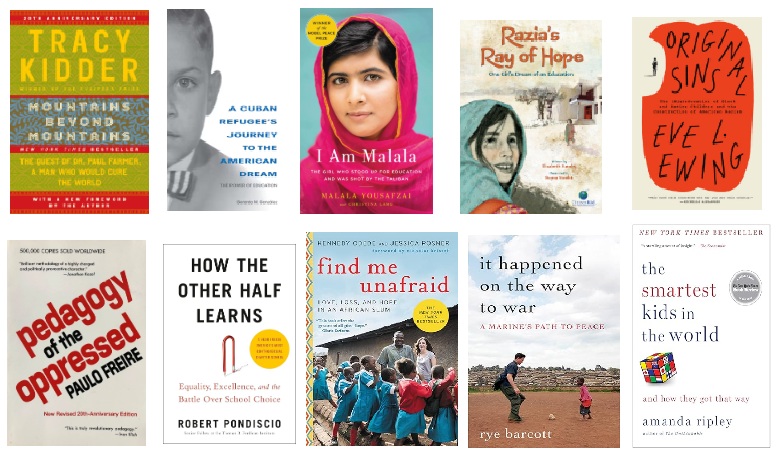What does it mean to be denied the chance to learn? For some students, it’s walking past a school they can’t afford to attend. For others, it’s risking their safety to sit in a classroom. And for many children, it’s growing up in systems that quietly decide their future before they’ve had a chance to make one.
At Givology, we work with grassroots partners around the world to change that and work towards making quality education accessible for all children by connecting donors with high-impact education projects that give students the opportunity to thrive. This reading list is compiled of powerful books, some memoirs, others more informative, highlighting the challenges facing education access today, but also the potential path forward.
Mountains Beyond Mountains by Tracy Kidder
This biography of Dr. Paul Farmer follows his work in bringing healthcare to the poorest communities in Haiti, Peru, and Rwanda. While not directly about schooling, the book highlights how education, global health, and social justice are all intertwined to exacerbate inequalities.
A Cuban Refugee’s Journey to the American Dream by Gerardo M. Gonzalez
This memoir follows Dr. Gonzalez’s escape from Cuba as a young boy during Operation Pedro Pan and his journey to becoming a nationally recognized advocate for education equity. His powerful story illustrates the power of public education and resilience in creating opportunity, especially in the experience of immigrant students finding belonging and purpose in education.
I Am Malala by Malala Yousafzai and Christina Lamb
Malala’s autobiography details her life in Pakistan under Taliban rule and her fight for girls’ right to education. Her story of surviving an assassination attempt and becoming the youngest-ever Nobel Peace Prize winner is now internationally known, but the essence is still urgent and relevant. Girls around the world are still denied access to basic education, and Malala reminds us that education is more than a privilege for select students, but a human right we must fight for.
Razia’s Ray of Hope by Elizabeth Suneby
This children’s picture book tells the story of a young Afghan girl, Razia, who dreams of going to the new school for girls that her village is building, despite pushback from her family. Inspired by the real-life work of Razia Jan, the book introduces younger audiences to the barriers girls face in accessing education.
Original Sins by Eve L. Ewing
Ewing explores the US education system that has long harmed Black and Indigenous students and perpetuates racial inequalities in education. She argues that schools have been active in reinforcing white intellectual superiority by preparing students for predetermined social roles based on their race. This book calls for a fundamental change in the education system and reimagines what public education could be if equity were prioritized.
Pedagogy of the Oppressed by Paulo Freire
This book explores the role of education in social transformation and liberation. Freire, also named the “Grandfather of Critical Theory,” argues that traditional education often treats students as passive recipients of information, a “banking model” that reinforces oppression. He instead proposes a student-centered approach that encourages dialogue and critical thinking, where students take an active role in their learning. This book highlights the crucial role education plays in maintaining and dismantling social inequality, especially in communities historically denied power.
How the Other Half Learns by Robert Pondiscio
This book explores Success Academy, a controversial free-to-attend New York City charter school network, focusing on the rigorous and unconventional methods used to achieve high academic results, particularly among low-income students of color. Pondiscio contrasts Success Academy with the challenges faced by many traditional public schools in underserved communities. He emphasizes socioeconomic factors, parental involvement, and school choice in shaping educational outcomes.
Find Me Unafraid by Jessica Postner and Kennedy Odede
This memoir tells the inspiring true story of Kennedy Odede, who grew up in the Kibera slum of Nairobi, Kenya, and Jessica Posner, an American college student from Denvelocer, Colorado. Their unconventional love story blossoms as they collaborate to found Shining Hope for Communities (SHOFCO), an organization dedicated to transforming the lives of girls in Kibera. Together, they establish Kibera’s first tuition-free school for girls, along with vital services like healthcare and clean water, demonstrating the profound impact two individuals from different worlds can have in combating poverty and hopelessness.
It Happened On the Way to War by Rye Barcott
In 2000, Rye Barcott was a student on an ROTC scholarship when he first visited the Kibera slum of Nairobi, Kenya. Once there, Barcott befriended a widowed nurse and a community organizer, and together they built Carolina for Kibera (CFK), an NGO that breaks cycles of violence and develops young leaders in one of Africa’s largest slums. Barcott continued his work with CFK while leading Marines in Iraq, Bosnia, and the Horn of Africa. The book chronicles his struggle to balance his leadership of CFK with his military service, including deployments to Iraq, Bosnia, and the Horn of Africa, demonstrating how the lessons learned in community building in Kibera informed his approach to peacekeeping and counterinsurgency in war zones.

Leave a comment